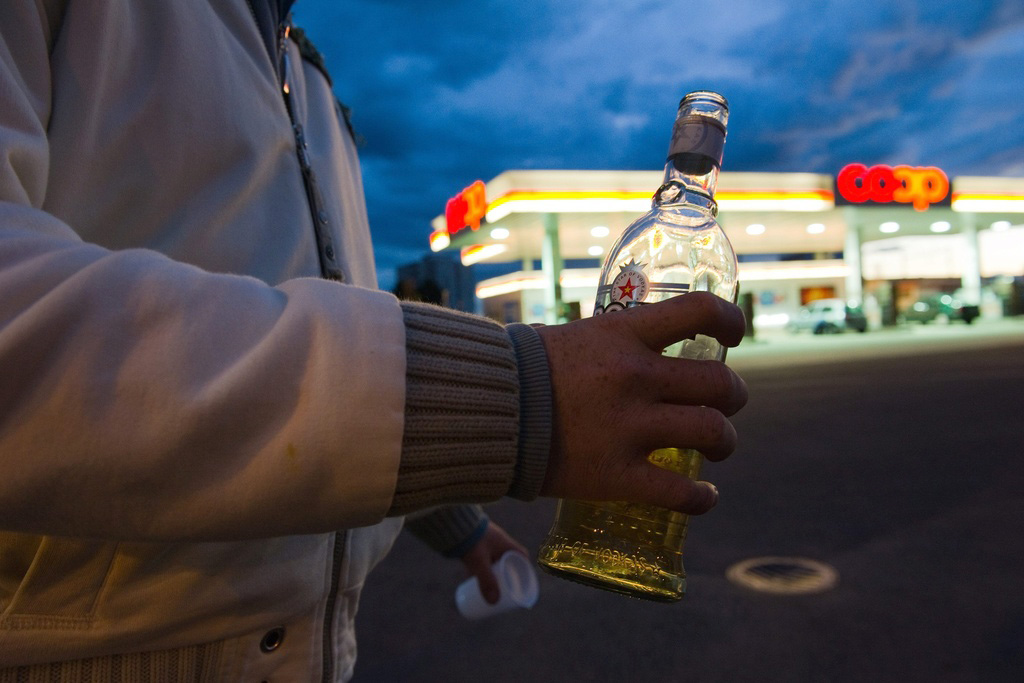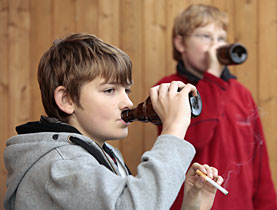Local alcohol bans fail to curb drunkenness

A nighttime ban on the sale of alcohol in Geneva has led to a marked decrease in the number of youths admitted to hospital with alcohol intoxication.
However, attempts by authorities in two towns in central and eastern Switzerland to curb the consumption of alcohol among the younger generation have proved less effective.
It is a familiar sight in many cities and towns across Switzerland: young people gather outside railway stations, in underground passageways and in parks, a six-pack of beer under their arm or a bottle of cheap spirits in their hand.
The general public often feel threatened and disturbed by youths who spend the evening drinking, partying and possibly leaving behind a pile of rubbish on the ground and graffiti on the walls.
Many local authorities have been trying to tackle the problem – with limited success.
The canton of Geneva appears to be an exception, as a ban on selling alcohol between 9pm and 7am has had a considerable impact.
A study published recently by the Federal Statistics Office found that the measure, introduced in the Geneva area five years ago, had led to a drastic reduction in cases of alcohol intoxication.
Based on figures from 2005 to 2007, the number of people aged between 16 and 29 who were taken to hospital after excessive consumption of alcoholic beverages had dropped by more than a third.
Tip of iceberg
But in the rest of the country the number of hospital admissions increased by 16 per cent in the same period, according to the survey conducted by the independent Addiction Info foundation.
While the authorities in 2005 recorded five admissions a day for intoxication, that number rose to six by 2007 or about 2,100 in total.
Experts have noted a decline in first aid cases, in particular among the ten to 15-year-old age group in Geneva.
“This is hardly a surprise,” says Monique Helfer of the Institute for the Prevention of Alcohol and Drug Problems. “Measures which restrict the sale of, and access to, alcohol are an excellent prevention measure.
But Helfer points out that the latest figures give only an incomplete picture – merely the tip of the iceberg. The statistics do not include cases of very drunk youths who were looked after by friends and family or taken home by police.
Pioneer
The findings have prompted a mixed reaction.
Addiction experts hope the example of Geneva will be followed elsewhere.
“The research in Geneva could serve as a basis for discussion in the long term. We would welcome other cantonal authorities launching a debate on time restrictions on the sale of alcohol,” says Helfer.
The association of Swiss cities has acknowledged that the Geneva findings are a surprise, but rules out moves to introduce a ban on sales in towns and cities across Switzerland.
“It only makes sense to ban the sale of alcoholic beverages where it is absolutely necessary,” says spokesman Martin Tschirren.
Other parks
Geneva is at the forefront of efforts to curb excessive alcohol consumption among youths and late-night binge drinking in public places.
But the town of Chur in eastern Switzerland in 2008 introduced an even more restrictive policy. It outlawed public alcohol consumption in the old town between 12.30am and seven in the morning.
However, the success of this measure is difficult to quantify as no data is available on alcohol intoxication admissions to hospitals in the region.
The ban has neither solved the problem of alcohol consumption in public nor complaints about loud noise at night.
Young drinkers have simply moved to another public park outside the old town but close to a residential area.
“This has sparked more heated discussions and a certain resentment,” says Marianne Lüthi of the canton Graubünden prevention agency.
Public pool
Discussions at a political level are underway in Lucerne, but no decision has been taken yet to curb the consumption or sale of alcohol.
In nearby Zug the authorities five months ago imposed a ban covering the area around the public swimming pools.
“The measure clearly helped to limit noise emissions from people who used to stay in the park till late at night,” says Andreas Bosshard of the Zug local council.
Yet as in Chur, the problem has refused to go away and drinkers have simply moved elsewhere in town, to the railway station and other parks.
The authorities see no need to impose restrictions in other areas. “At least not for the moment,“ says Bosshard, who is in charge of security, environment and social affairs.
Swiss law prohibits the sales of beer and wine to those under 16. Spirits and alcopops may only be sold to those over 18.
A 2007 international study on adolescent substance use found that Switzerland is very close to the European average.
A majority (85%) of 16-year-old students had consumed alcohol during the past 12 months and 41% had been drunk during the same period.
The Swiss government has proposed measures as part of a national action plan to combat teen drinking. They include increasing the drinking age, making alcohol more difficult to purchase and applying higher taxes.
Unlike in many parts of North America, drinking alcohol in public in Switzerland is permitted. In the evenings, especially at weekends, major railway stations are often teeming with young people, drink in hand.
Switzerland is not the only European country combating the problem of binge drinking. The head of a British police association recently made remarks about his country’s “binge drinking culture”.
(Adapted from Italian by Urs Geiser)

In compliance with the JTI standards
More: SWI swissinfo.ch certified by the Journalism Trust Initiative













You can find an overview of ongoing debates with our journalists here . Please join us!
If you want to start a conversation about a topic raised in this article or want to report factual errors, email us at english@swissinfo.ch.